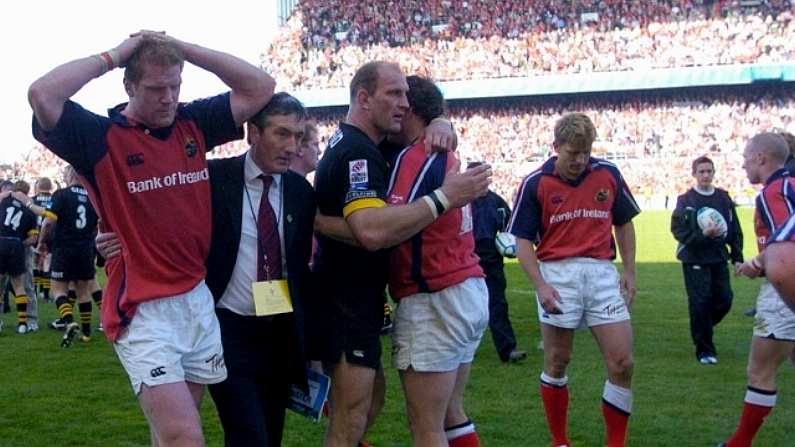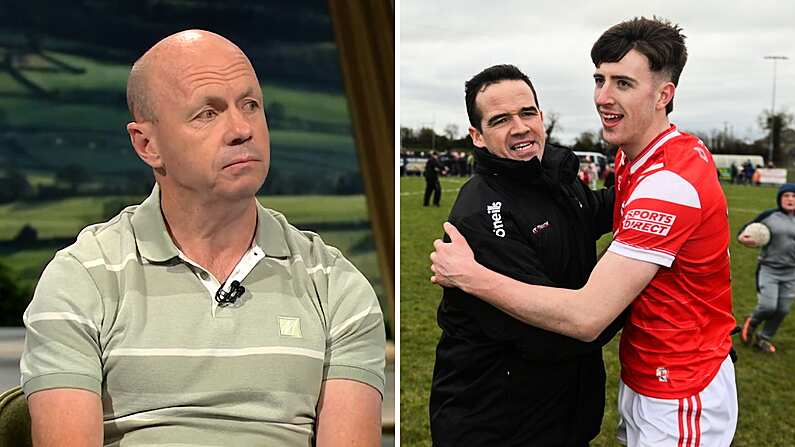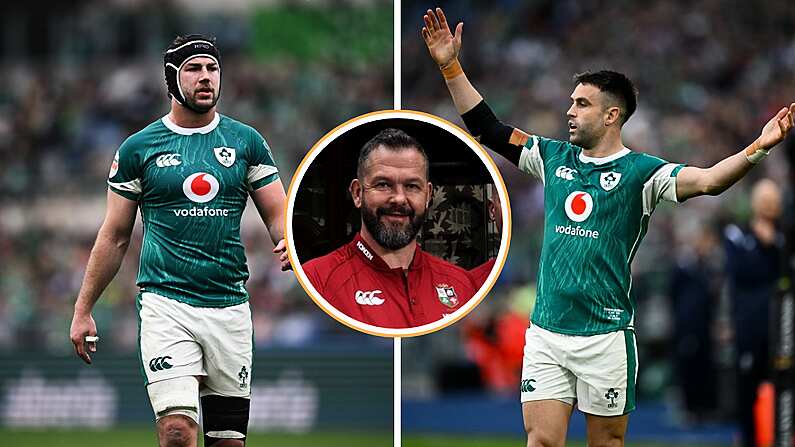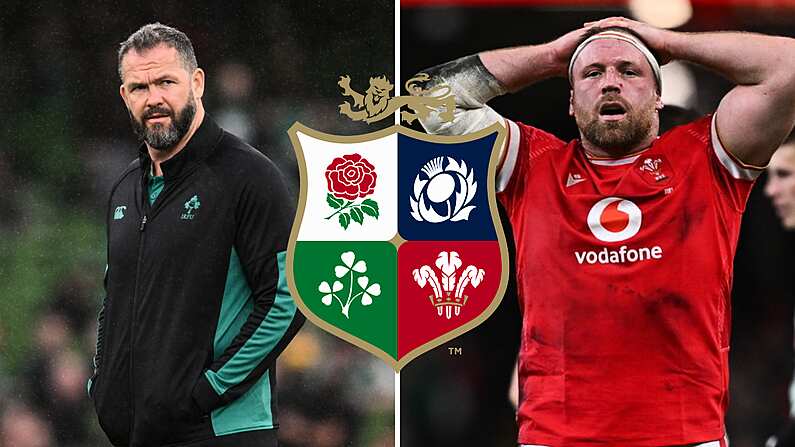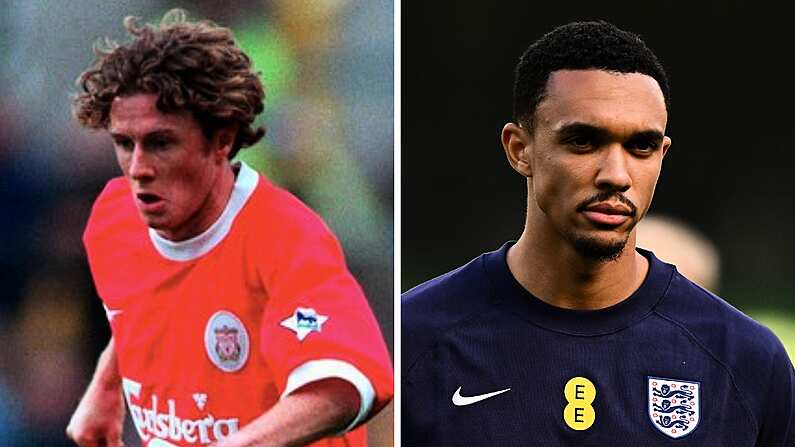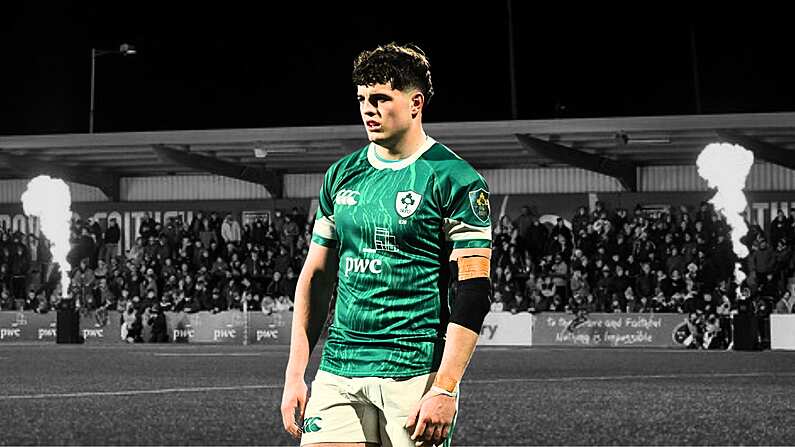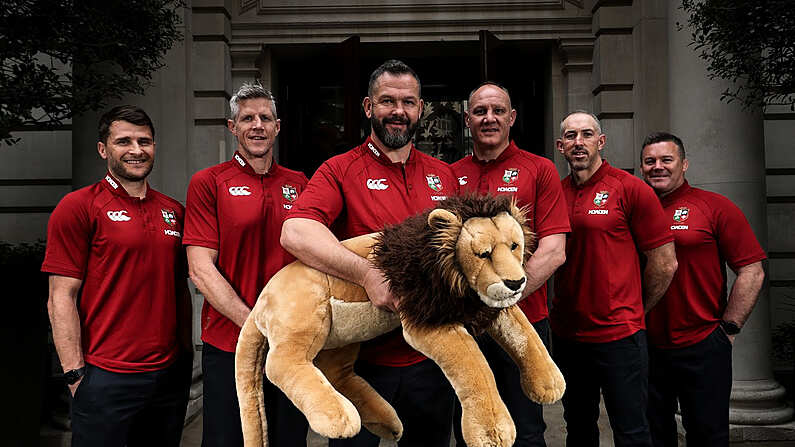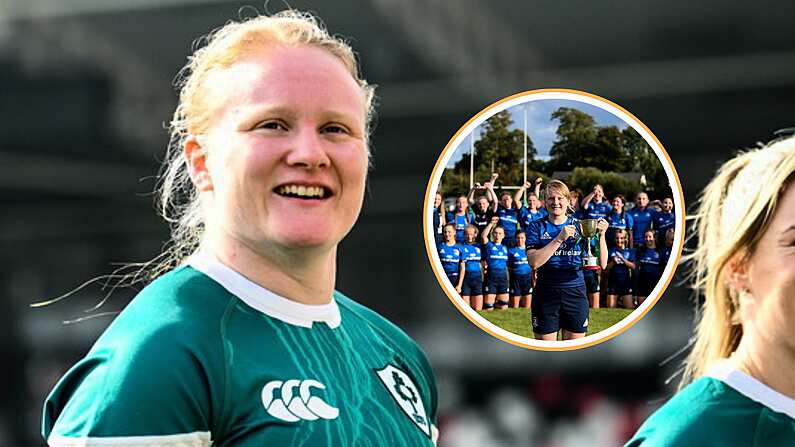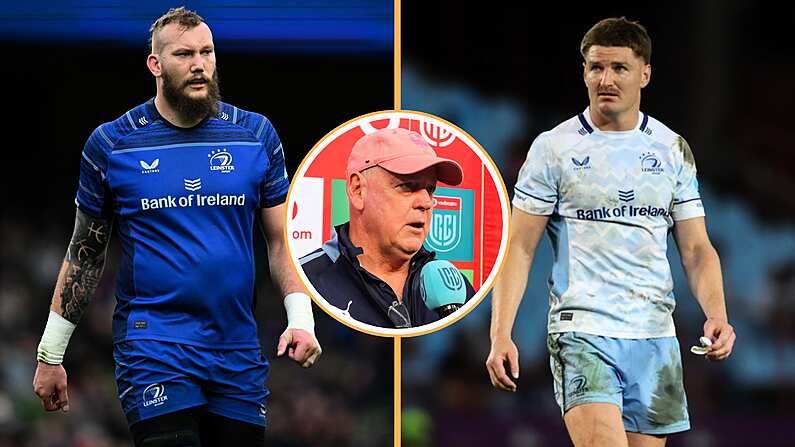"It was a fantastic game – without doubt the best club game I’ve ever been involved in."
- Lawrence Dallaglio, Wasps captain
"Going through something like that is the reason we did eventually go onto win a European Cup and a second one on top of that. It’s the stuff that we learned from losing to Wasps."
- Marcus Horan, Munster prop
By the ninth season of the Heineken Cup, winning the competition had become an obsession for Munster.
The province had reached the final on two occasions - losing both times to English opposition. They had also reached the semi-finals in two other seasons.
They would again make the semi-finals in 2004, playing Wasps in what is ranked as one of the tournament's greatest ever games.
It was an encounter which enhanced the Munster legend, being played in front of a record crowd for a semi-final. And, in the team's pursuit of that ultimate prize, the game was a key signpost for the direction it needed to take.
THE SCRAMBLE
Kevin Nyhan left his house at 2am and headed for Cork City, arriving an hour later. He knew well the queue which was about to assemble and didn't want to be too far down it.
"We queued all the way around Musgrave Park," says Nyhan, a long-time Munster supporter.
"It was rugby people and non-rugby people. It was a real taste of everything and everybody.
"I'm in the construction trade in Cork. We used to always get tickets off our suppliers but even for them at that time, it was tough to get them.
"People wanted to be part of it."
From the final whistle of the quarter-final against Stade Francais, the race for tickets which was about to see its off was on the mind of every ordinary supporter.
It was Munster's fifth consecutive season reaching the semi-final stage but this year was different: The game was being played at Lansdowne Road. It would be Munster's first final four game in Ireland.
"I remember the hype around the game was huge," tells Marcus Horan, who started at loosehead prop for Munster. "Trying to keep ourselves grounded was one of the difficult things really."
A strong Six Nations from Ireland in which they finished second behind France, beat England at Twickenham and won the Triple Crown no doubt made that task even tougher.
Underestimating the demand, Munster only requested an allocation of 20,000 tickets. The European Rugby Commission's PR man Diarmuid Murphy told the Irish Times that had Munster asked for a larger allocation they would have received it. 25,000? 30,000? It would have been theirs.
Tickets went on sale on the Thursday following the quarter-finals, ten days before the date with Wasps. At Thomond Park on that morning, the rain bucketed down but still the masses turned up and waited. Many would leave disappointed.
A postal strike in Ireland at the time meant a decision was taken to not sell tickets via the internet. Consequently, the ERC wanted a "swift distribution network". Leinster, sensing an opportunity, took an allocation of just over half Munster's to fulfil that need. There would be queues in Donnybrook and Blackrock as a result.
In what was a different era for rugby, where the marginal gains were only beginning to be exploited, Lawrence Dallaglio produced some prime dressing room wall material for Munster, penning a column for The Sunday Times on the day of the game.
Wasps "are a humble club from a tiny corner of West London" who "play our matches at the end of an industrial estate in High Wycombe" wrote their then 31-year-old captain.
A few thousand Wasps fans would travel to the game, ten per cent of them aboard a chartered jumbo jet nicknamed 'Wasps 1'. According to The Sunday Times, a suggestion on Irish airwaves that the odd ticket from Wasps' portion might not have found a home caused a bombardment of the club's phone lines which lasted for days - there were no tickets left over.
"The tickets I got were quite good and I was sitting in the stand down below the alickadoos," says Nyhan.
"I was sitting next to Pa Whelan, he played for Munster for years, and sitting behind him was Jim Glennon, a Leinster man. I remember turning to Pat and saying, 'How come they're getting our tickets?' At the time, Leinster didn't register in the Heineken Cup at all.
"I remember being genuinely angry that there were Leinster people there who got tickets and yet we were scrambling for tickets down below in Munster."
THE GAME
"The whole weekend was unbelievable. We got there on a Friday and Dublin was awash with Munster men all wearing their red rugby shirts, telling us how difficult it would be on Sunday. When Sunday came, Lansdowne Road was a picture. It was a beautiful sunny day, the most amazing crowd that I've ever played in front of. There were 45,000 Munster men shouting, singing, screaming and we had 2,000 Wasps fans trying to be heard."
- Alex King, Wasps out-half
Warren Gatland was in his second full season with Wasps when his side met Munster. For the New Zealander, the game had added spice: two-and-a-half years earlier, he had been ousted as Ireland head coach in acrimonious circumstances with his assistant Eddie O'Sullivan installed as successor.
Gatland joined Wasps as a coach six weeks after being sacked by Ireland in late November 2001. Just six weeks after moving to the English Premiership side, he was promoted to Director of Rugby when Nigel Melville resigned.
"When we knew we had to travel to Lansdowne Road to play Munster in the Heineken Cup semi-final," said Lawrence Dallaglio in his autobiography, "I immediately thought the match would have a special significance for Warren Gatland because of the way he had been ditched by Ireland."
I didn't know the specifics and in the lead-up to the game, I asked him.
`What was the story over there?'
`Look mate, you don't need to know. Suffice to say, I want to fucking win this game.' `
'Yeah,' I said, 'I'm sure you do.'
I wasn't the only one thinking about Warren going into this game - other Wasps players felt the same and I let it be known in the changing room that this was an ideal match for us to repay some of the faith the coach had shown us.
Gatland's effect on Wasps had been immediate, lifting them from second from bottom of the Premiership when he arrived in 2002 to champions the following season, wresting Leicester's four-year grip on the title.
Munster entered the semi-final in an unfamiliar situation: They did not have that total underdog status often so curiously coveted in Irish sport.
"We probably had other games we’d won where no one was giving us a chance," says Marcus Horan.
"Whereas you could have argued that we were favourites for that game. Maybe we didn’t deal with that well enough.
"All these things are a learning process. You look at Munster nowadays or even a couple of years back, they dealt with the favourite's tag a lot better than we did back then.
"Sometimes we loved being the underdogs - it was something to fight for. In some ways, those days have to be gone, you have deal with the fact that you’re a favourite in a game and live up to it."
Though David Wallace looked fine in the eyes of Munster coach Alan Gaffney, their medics took a different view. Wallace, one of Munster's strongest ball carriers, had contracted chicken pox in the build-up and would be replaced in the starting line-up by the 21-year-old Stephen Keogh.
Still, it was a strong Munster team, one featuring 13 internationals. Keogh and the reliable back Shaun Payne were the only uncapped players.
It was a thrilling game, one which Dallaglio would later say his team won because "they happened to be ahead when the music stopped".
After Ronan O'Gara knocked over an early penalty, Wasps answered with a Josh Lewsey try. The Munster out-half notched two more kicks before being forced to leave the game injured on the half-hour mark. New Zealander Jason Holland, more accustomed to the 12 jersey than the 10, was his replacement.
"It was reported afterwards that I’d pulled a hamstring in contact and at first that’s what I thought it was," said O'Gara in his first autobiography.
It was the weirdest feeling. I got out of a ruck and it was like a temporary paralysis of my right leg. I tried to continue but I couldn’t run it off. It turned out that there was nerve damage in my lower back.
I heard years later from one of their players that Wasps spoke about getting me ‘off the park’. In rugby you can achieve that without going outside the rules and even without malice.
Over the years with Munster we often targeted the opposing number 10 and tried to get into him. They didn’t do anything illegal to me. I expected traffic in my channel – I always do – but that day it was rush-hour. Dallaglio led the charge and the rest followed.
Wasps' rush defence, then a relatively novel ploy implemented by Shaun Edwards, was another tactic which disrupted Munster on the day.
"I don’t believe Munster will have encountered a side like Wasps before," wrote Dallaglio in his Sunday Times column. "Defence wins championships, and we have one that gives very little away."
In some ways, he was right. The blitz gave Munster little time on the ball. Still, they put points on the board.
The first half ended with Wasps 17-15 ahead, a lead they would further advance early in the second period through a Mark van Gisbergen try.
When Fraser Waters was sin-binned after 55 minutes, Munster seized the advantage in that ten minutes, taking a ten-point lead through tries from Anthony Foley and Jim Williams, and the boot of Holland.
Though there appeared dejected looks on the faces of Gatland and Dallaglio, Wasps were not done.
"In spite of the gravity of the situation," said Dallaglio in his book, "we were calm because we felt we would win."
We were dominating despite the scoreline, and we were all saying the same thing – ‘We’re not going to lose this game.’
I don’t remember many grounds having a stadium clock in those days but Lansdowne Road had one. ‘Is that right, ten minutes to go?’ I asked the ref. ‘Yeah,’ he said, ‘that’s the time.’
It was a help to know that because it told us there was no need to panic, but we did need some points sharpish.
The resolve which Wasps showed in that situation was a factor from which Munster would learn according to Marcus Horan. A strange thought considering the Irish side would have been considered the experts of the day in that characteristic.
Wasps were buoyed by Munster having two players sin-binned in those crucial moments. Three minutes after stealing the lineout which led to the Williams try, Donnacha O'Callaghan was shown a yellow card. Just as O'Callaghan was nearly ready to return - and with Munster still holding a seven-point lead - they were briefly reduced to 13 when Rob Henderson blatantly entered a ruck from the side.
In the following five minutes, the game was yanked from Munster's grasp. Tom Voyce burst through the Munster line, touching down close enough for Alex King to easily add the extras and level the game.
From the kick-off, it was Voyce who again did the damage, breaking down the wing to set up the outpost from which Wasps would fire the killer shot.
It was their bulky Samoan hooker, Trevor Leota, who barrelled over in the corner despite desperate tackles from John Kelly and Peter Stringer. After an inspection from the TMO, the try was awarded.
"It takes us ten months to get him fit but when his weight's down he's mobile and plays good rugby," Gatland said regarding Leota after the game. "He's been known to sneak off to McDonald's and KFC from time to time but he can do whatever he wants tonight."
The final whistle would follow three minutes later with the scoreboard reading Munster 32 Wasps 37. The English side had scored five tries to Munster's two.
Gatland, usually the wearer of a deadpan poker face, held a grin for the evening.
"The dressing room, the overall feeling was that it was an opportunity lost, a massive opportunity," says Horan.
"Everyone was in their little corner for a few minutes trying to deal with their own disappointment.
"That’s not taking away from Wasps, we knew what kind of force they were. But because we were ahead, because we had it in the palm of our hand, it didn’t matter what the team was, the way that it went, everyone was so gutted.
"My main memory afterwards is going home on the train with supporters on board.
"That was what made it tougher: a lot of people going around - even ourselves - asking each other, ‘are we ever going to break through in this competition?’ I’m sure the supporters were saying the same thing on the train.
"As the night went on, you went back through the carriages and met a few people that you know, you realise that you’re all in this together and we’re all suffering the same disappointment. It does make it easier. That was the unique thing about ourselves and our supporters: we suffered all these things together."
A LEARNING DAY
"We had come up short again. There were tears but we weren’t feeling sorry for ourselves. To come back we needed to be even harder on ourselves and whatever we lacked we never lacked the guts for that process."
- Ronan O'Gara, Munster out-half
Though losing two players to yellow cards in those vital minutes of the semi-final was undoubtedly a factor in Munster's capitulation, it was not used as an excuse.
Come the end of season review, the feelings of others were not a consideration according to Marcus Horan. Players had their focus still firmly fixed on the goal of winning the Heineken Cup and if it was felt someone was not giving it their all, they were going to be told.
"But what really disappointed us when we sat down for the end-of-season review was that Wasps had been fitter than us," said John Hayes in his book.
They were fitter, stronger, more dynamic. That really troubled us at the time because we thought we were a very professional outfit by then. And we were; our whole approach had been transformed over the previous three or four years.
What happened was that Wasps had come along and raised the bar. They had pushed physical preparation to the next level. We were hearing rumours that the English teams were using full-time dieticians and bulking up not just in the gym but with the use of supplements too.
Whatever the factors, Wasps were fitter than us, and that was something we’d have to address.
"Maybe even that would have been directed at strength and conditioning coaches, to say, ‘Look, we need to do things a bit smarter and train a bit smarter’," says Horan.
"There was probably more of a focus on being on the rugby pitch a lot more where we probably needed to do a little bit more in pre-season and maybe even away from the rugby pitch during the season.
"It was probably a shift towards doing that a little bit more and getting the scores in the gym up a little bit more to help you. We had good rugby players, we had good footballers, we just needed to get them a bit more physically ready for the game.
"We were mature enough to take a look at ourselves at the end of that season and say, ‘We’re not quite there yet’. You look at their pack compared to ours and what they did in that game, we needed to take a serious look at ourselves as a unit and as individuals and say, ‘Can we do more?’
"At the end of that season, we realised that and our approach in the pre-season of the following season was slightly different. We were better for it."
In his book, Paul O'Connell said the changes which were made to the backroom team for the following seasons were simply "window dressing".
"The real change that came from that day," said O'Connell, "was that a core group of players became more determined than ever before to make Munster successful. It wasn't that the organization itself got better. It was that the hardest trainers in the group drew on the Wasps defeat. That was what really made the difference."
Two years later, at the Millennium Stadium in Cardiff, Anthony Foley would lift the Heineken Cup after beating Biarritz in the final. Paul O'Connell would also do so two years after that.
It was the guts which Munster showed on the pitch which got them in the race for those trophies but it was the will to constantly learn and improve that got them over the line.
Picture credits: Sportsfile

